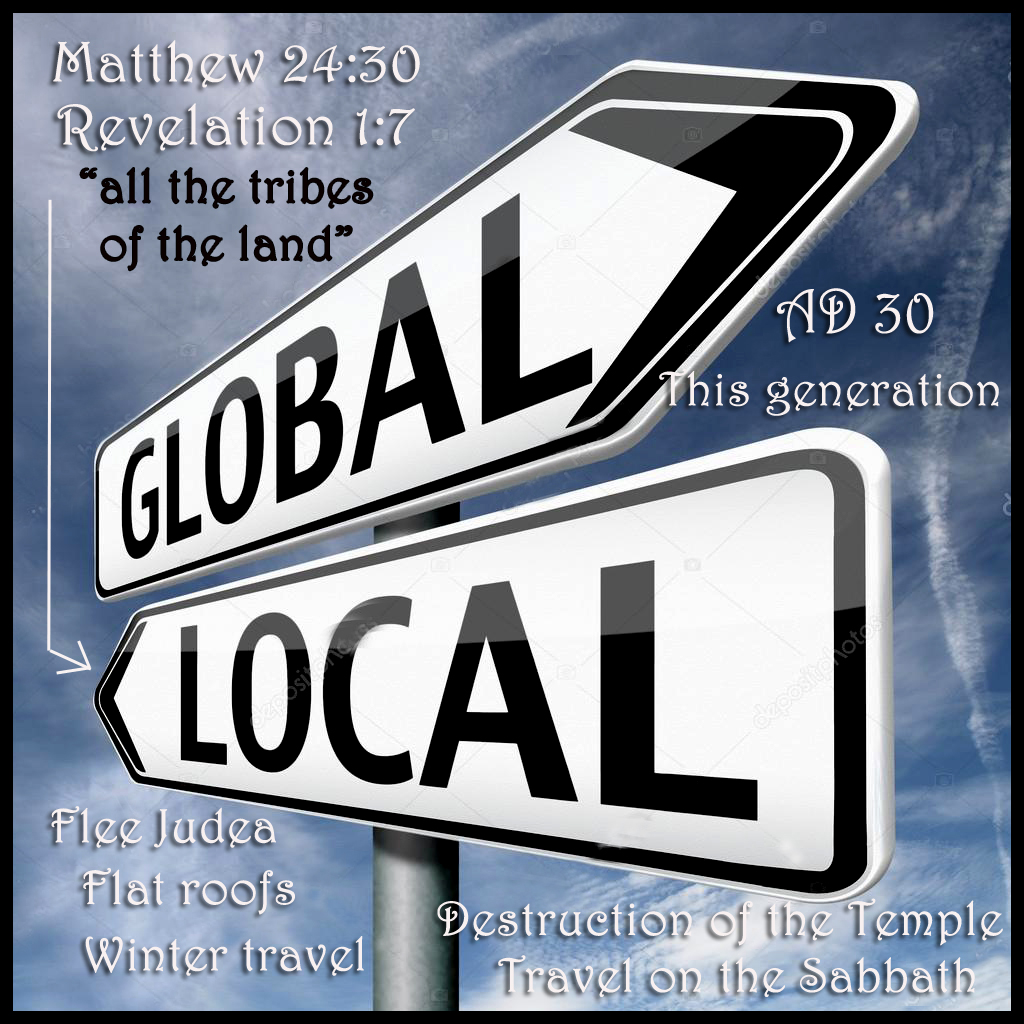 In my last blogpost I highlighted translator biases in the way four Greek words (GE, OIKOUMENE, AION AND MELLO) have been translated. Unbeknownst to the reader these seemingly insignificant words have helped skew eschatological perceptions for centuries. If you had a chance to read it, I mentioned that “ge” was translated “earth” two critical times, once in the Olivet Discourse (Mt 24; Mk 13 and Lk 21) and once in the Revelation.
In my last blogpost I highlighted translator biases in the way four Greek words (GE, OIKOUMENE, AION AND MELLO) have been translated. Unbeknownst to the reader these seemingly insignificant words have helped skew eschatological perceptions for centuries. If you had a chance to read it, I mentioned that “ge” was translated “earth” two critical times, once in the Olivet Discourse (Mt 24; Mk 13 and Lk 21) and once in the Revelation.
(Matthew 24:30 NASB) And then the sign of the Son of Man will appear in the sky, and then all the tribes of the earth will mourn, and they will see the Son of Man coming on the clouds of the sky with power and great glory.
(Revelation 1:7 NASB) Behold, He is coming with the clouds, and every eye will see Him, even those who pierced Him; and all the tribes of the earth will mourn over Him. So it is to be. Amen.
I contended that “all of the tribes of the land” is a more appropriate translation given the Olivet’s context. What many don’t realize is how easily their eschatological presuppositions can be altered by the word choices of the translators.
Let me explain. In that 1st century era (approx. AD 30), everything about Jesus’s Olivet (Mt 24; Mk 13; Lk 21) was Israel-centric. Jesus was not prophesying what would take place in China or South America but rather concerning the 1st century Roman Empire. So, in my view, there is no justification for translating “ge” as “earth” if one considers the following:
1. The temple’s destruction (there is no temple today) Mt 24:2
2. Fleeing Judea (not Dover, FL or Bangor ME) Mt 24:16
4. Fleeing housetops (better buy a mobile home so we can flee) Mt 24:
3. Travel difficulties on the sabbath and in the winter (neither of which are issues in 2023 America) Mt 24:19
5. The abomination of desolation in the holy place (the only holy place today is within the heart of the Christian) Mt 24:15
6. Not to mention the 18 times Jesus referenced “YOU” i.e. His disciples. (not residents of Brandon, FL or St. Louis, MO)…
None of the above lead one to believe that Jesus was speaking globally, unless of course one is wrought with the same presuppositions as the translators. Therefore, “land”, as in “the land of Israel” is the better option.
Then we have “erets” which is the Hebrew counterpart to the Greek word “ge”. Erets can be translated either “land, earth, ground, surface…”. Following is a passage from Genesis 41 regarding the famine experienced in Egypt. Notice the NASB’s shift from “land” to “earth” in the last verse. You decide whether the context warrants such a change.
(Genesis 41:53-57 NASB) When the seven years of plenty which had been in the LAND [erets] of Egypt came to an end, and the seven years of famine began to come, just as Joseph had said, then there was famine in all the LANDS [erets], but in all the LAND [erets] of Egypt there was bread. So when all the LAND [erets] of Egypt was famished, the people cried out to Pharaoh for bread; and Pharaoh said to all the Egyptians, “Go to Joseph; whatever he says to you, you shall do.”
When the famine was spread over all the face of the earth [erets], then Joseph opened all the storehouses, and sold to the Egyptians; and the famine was severe in the LAND [erets] of Egypt. The people of all the EARTH [erets] came to Egypt to buy grain from Joseph, because the famine was severe in all the EARTH [erets].
People from around the globe weren’t traveling to Egypt looking for food but that’s how it appears given the change from LAND to EARTH. Without knowing that the same Hebrew word “erets” was used in ALL instances of both “land” and “earth”, how would you know that liberties were not taken?
It should be noted that there was a famine in Canaan but it was not said to have been worldwide in scope. When “earth” is used, it one immediately thinks “global”. However, in the above passage there was a certain geographic region in view i.e. “the land of Egypt.”
As I mentioned above, “erets” much like “ge” can be translated “land”, “earth”, “dirt” etc. However, context controls usage and in my view “land” is the better option. Can you see how the biases of the translators can skew our conclusions.
The moral of the story is that if we read casually and never drill down into the passage, it can skew our conclusions. That’s why studying is so important. So, unlike the KJV translating the Greek words “kosmos”, “oikoumene” and “aion” all as “world”, “ge” (Greek) and “erets” (Hebrew) change meanings primarily based upon usage. That’s why I recommend using Bible software (specifically a lexicon) while consulting a plethora of translations.
